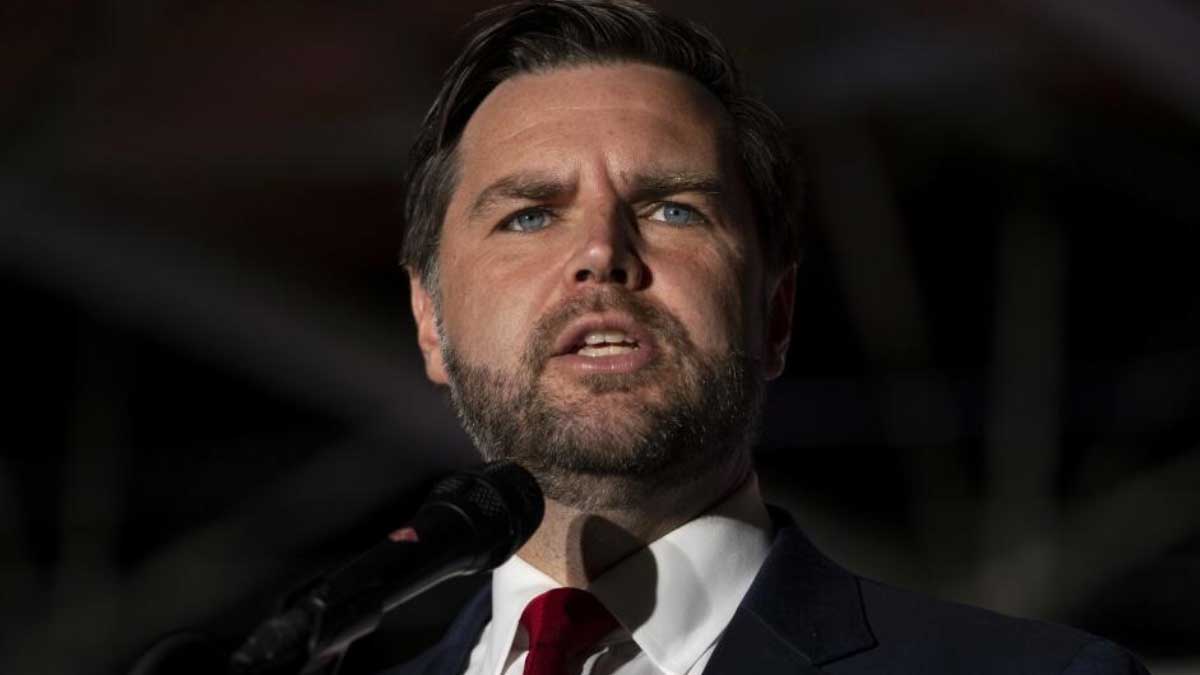- Home
- Billionaires
- Investing Newsletters
- 193CC 1000
- Article Layout 2
- Article Layout 3
- Article Layout 4
- Article Layout 5
- Article Layout 6
- Article Layout 7
- Article Layout 8
- Article Layout 9
- Article Layout 10
- Article Layout 11
- Article Layout 12
- Article Layout 13
- Article Layout 14
- Article Sidebar
- Post Format
- pages
- Archive Layouts
- Post Gallery
- Post Video Background
- Post Review
- Sponsored Post
- Leadership
- Business
- Money
- Small Business
- Innovation
- Shop
Recent Posts
Vance Reverses on Trump’s Abortion Ban Stance

Ohio Sen. JD Vance faced significant scrutiny on Sunday after he refused to clarify whether former President Donald Trump would veto a national abortion ban, despite previously suggesting Trump would take such action. Vance’s refusal to stand by his earlier statement follows Trump’s similar stance during a recent presidential debate, where the former president avoided committing to a definitive position on the issue. During an appearance on NBC’s “Meet the Press” with Kristen Welker, Vance was repeatedly asked whether Trump would veto a national abortion ban if passed by Congress. Instead of providing a direct answer, Vance dismissed the question as hypothetical, calling it “a ridiculous hypothetical” and expressing a desire to focus on more pressing matters that might actually come before the president. He also suggested that such a scenario is unlikely, reinforcing the idea that discussing it would be futile.
Vance’s comments marked a departure from his previous statements just weeks earlier. Less than a month before his appearance on “Meet the Press,” Vance had told Welker that Trump would indeed veto a national abortion ban if one were to be proposed. However, when Trump was confronted with this statement during a recent presidential debate, he dodged the question and refused to commit to vetoing a ban. Trump also claimed that he had never discussed the issue with Vance. During the interview on Sunday, Vance confirmed that he had not spoken with Trump about the topic, echoing the former president’s remarks. He stated that he and Trump “still haven’t discussed” a potential abortion ban, reiterating that Trump does not support such a policy. Vance downplayed the likelihood of a national ban being passed through Congress, aligning his comments with Trump’s position that the issue is best left to the states.
When pressed again by Welker on whether Trump would veto a national abortion ban if it ever reached his desk, Vance expressed hesitation to speak on behalf of the former president, stating, “I think that I’ve learned my lesson on speaking for the president before he and I have actually talked about an issue.”
The abortion debate is expected to be a central issue in the upcoming elections, with Democrats emphasizing that a Republican-controlled Congress could push for sweeping restrictions or outright bans on the procedure. Following the Supreme Court’s decision to overturn Roe v. Wade, which guaranteed federal abortion rights, many Republican figures have argued that decisions surrounding abortion should be left to individual states. Both Trump and Vance have taken positions favoring a state-based approach, yet there remains ambiguity about their willingness to engage with a federal ban. Trump has made contradictory statements on abortion throughout his career, shifting from a “very pro-choice” stance in 1999 to a more anti-abortion position during his presidency. In 2016, he controversially suggested that women who seek abortions should face punishment, though he later retracted that statement. While in office, Trump supported a federal 20-week abortion ban, further complicating his current stance on the issue.
Vance, who identifies as pro-life, has consistently advocated for states to determine their own abortion laws. Yet, as recently as 2022, he signaled support for making abortion illegal on a national level, leaving some voters unclear on where he truly stands.
Vance’s refusal to provide a clear answer regarding Trump’s stance on a national abortion ban comes at a time when Republicans are facing intense pressure to clarify their positions on the issue. Many GOP leaders have expressed reluctance to support federal abortion restrictions, preferring instead to allow states to set their own policies. However, Democrats have seized upon the lack of clarity to raise concerns about the potential for a national ban if Republicans regain control of Congress.
Trump’s evasion of the question during last week’s presidential debate has further fueled speculation about his true views on the matter. Despite signaling that he does not support a national abortion ban, Trump has stopped short of saying he would veto one if it were approved by Congress. This ambiguity has raised concerns among some voters, particularly as abortion continues to be a highly polarizing issue in the U.S.
As of now, 18 states have implemented bans on most or all abortions, with some exceptions. Two additional states have seen their abortion bans blocked by the courts, while three others have passed restrictions that limit the procedure after 12 or 15 weeks of pregnancy. The growing number of state-level abortion bans has heightened the stakes for voters ahead of the upcoming election, as both parties vie for control of Congress and the presidency. Republicans have been quick to point out that the Supreme Court’s decision to overturn Roe v. Wade was a victory for states’ rights, allowing each state to set its own abortion laws. Vance and Trump have echoed this sentiment, insisting that the issue should remain under state jurisdiction rather than being imposed at the federal level.
However, abortion rights advocates argue that the lack of federal protections could lead to dangerous inconsistencies in access to reproductive healthcare across the country. They have expressed concern that a patchwork of state-level laws could force women in states with strict abortion bans to travel long distances to receive care, disproportionately impacting low-income individuals.
In addition to his comments on abortion, Vance also faced backlash for remarks he made about Haitian migrants. During the interview on Sunday, he repeated a controversial claim that migrants in an Ohio town had been eating local residents’ pets. Despite this assertion being disproven by local officials, Vance stood by his statement, saying his constituents had provided “firsthand accounts” of the incidents. Vance explained that he raised the issue to draw media attention to the growing concerns about migration in Springfield, Ohio, accusing the media of ignoring the problem. The claim was repeated by Trump during his debate with Vice President Kamala Harris, further escalating the controversy.
As both Trump and Vance continue to navigate their positions on key issues like abortion and immigration, their stances are likely to play a significant role in shaping public opinion ahead of the 2024 election. With voters closely watching how these leaders address such polarizing topics, the pressure to clarify their positions remains high.
Recent Posts
Categories
- 193cc Digital Assets2
- 5G1
- Aerospace & Defense46
- AI37
- Arts3
- Banking & Insurance11
- Big Data3
- Billionaires449
- Boats & Planes1
- Business328
- Careers13
- Cars & Bikes76
- CEO Network1
- CFO Network17
- CHRO Network1
- CIO Network1
- Cloud10
- CMO Network18
- Commercial Real Estate7
- Consultant1
- Consumer Tech180
- CxO1
- Cybersecurity68
- Dining1
- Diversity, Equity & Inclusion4
- Education7
- Energy8
- Enterprise Tech29
- Events11
- Fintech1
- Food & Drink2
- Franchises1
- Freelance1
- Future Of Work2
- Games141
- GIG1
- Healthcare78
- Hollywood & Entertainment186
- Houses1
- Innovation42
- Investing2
- Investing Newsletters4
- Leadership65
- Lifestyle11
- Manufacturing1
- Markets20
- Media193
- Mobile phone1
- Money13
- Personal Finance2
- Policy567
- Real Estate1
- Research6
- Retail1
- Retirement1
- Small Business1
- SportsMoney33
- Style & Beauty1
- Success Income1
- Taxes2
- Travel10
- Uncategorized8
- Vices1
- Watches & Jewelry2
- world's billionaires418
Related Articles
Trump Moves $4B Stake in Truth Social Parent, Stock Drops 6%
Donald Trump recently transferred his 57% stake in Trump Media & Technology...
By 193cc Agency CouncilDecember 20, 2024House Rejects Trump-Backed Funding Bill, Shutdown Looms
The U.S. House of Representatives rejected a new government funding bill on...
By 193cc Agency CouncilDecember 20, 2024Trump Named Time’s Person of the Year for Second Time
On Thursday, Time magazine honored Donald Trump as its “Person of the...
By 193cc Agency CouncilDecember 12, 2024Meta Donates $1 Million to Trump’s Inaugural Fund
Meta, the parent company of Facebook and Instagram, has confirmed a $1...
By 193cc Agency CouncilDecember 12, 2024















Leave a comment